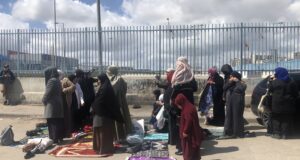Ilene R. Prusher | Christian Science Monitor
4 August 2009
It was 13-year-old Diala who was awoken first, just after 5 a.m. on Sunday morning, by the commotion outside. She rushed to the window, saw special riot police in black uniforms, and ran to wake her parents.
By the time she did, the Israeli police were already breaking in through doors and windows, forcing the 17-member Hanoun family – three brothers, their wives, and children – to leave the home their relatives acquired a half-century ago. In all, 58 Palestinians were evicted in this predominantly Arab neighborhood of East Jerusalem, Sheikh Jarrah.
Though they had received – and refused to obey – a court order in May to leave after losing a longstanding dispute over property rights, it was still a shock.
“I had one shoe on and one off, and the policeman who was ordering me out tried to move aside the glass they broke to make sure that I didn’t cut my feet,” says Diala’s mother, Nadia Hanoun. A few hours later, they stood across the street and watched as the police escorted a few families of Jewish settlers into their homes.
“He was concerned about my feet bleeding, but he doesn’t see the bleeding in my heart. It’s so difficult for us to see them move in people who are not from here, into our house, into the home my husband was born in, while we’re on the street,” says Mrs. Hanoun, sitting in the shade of a tree about 50 feet from their front door, now blocked off by a line of security barriers and several police vans with flashing lights. The family has for two nights slept on the thin mattresses piled behind her; she says they have no other place to go.
The events in Sheikh Jarrah garnered international censure from the European Union, the United Nations (UN) and from Britain, which said it was “appalled” at the move. US Secretary of State Hillary Clinton on Monday night called the Israeli evictions “deeply regrettable” and “provocative.” Such a move “is not in keeping with Israeli obligations and I urge the government of Israel and municipal officials to refrain from such provocative actions,” she said.
Who is responsible?
Neither the Jerusalem municipality nor any government office is taking responsibility for the incident, pointing instead to the courts. There, a decades-long battle over the houses has ensued, in which a group of Jewish families say they can show that their forbearers owned the houses here as far back as the late 19th century, when the area was administered by the Ottoman Empire. The Jewish families say they were forced to abandon the houses during a spate of Arab attacks in the area in the 1920s and 30s. In the war for Israel’s establishment in 1948, the territory became part of Jordan.
In 1956, 28 Palestinian families who were refugees from Israel after 1948 were resettled in Sheikh Jarrah as part of an UN project to assist people made homeless in the war. The Hanoun family, who say they are originally from Haifa, was one of the recipients – and Maher Hanoun, Nadia’s husband, was born in the house.
The story gets more tangled from there. Both the Israelis and Palestinians involved in the dispute say that they have Ottoman-era property ownership documents called tabu which proves that they are the rightful owners. Palestinians say that the Hijazi family – who now live elsewhere in Jerusalem – can show they own the land. But the Jewish families, represented legally by a real estate group called Nahalat Shimon International also have Turkish tabu papers they say prove the land is theirs.
According to a briefing (PDF) by Israeli advocacy group Ir Amim, an Israeli group that opposed the evictions and advocates a Jerusalem “equitably shared by the two peoples,” Nahalat Shimon is seeking to build a 200-unit settlement, Shimon HaTzadik, in the area. It’s unclear who is behind the real-estate company, which is sometimes characterized as a settler group.
“We don’t focus on the specific settlers’ groups because in our view the one who is really responsible in these cases is the Israeli government and the municipality,” says Orly Noy, a spokesperson for Ir Amim,
After an Israeli court ruled in the Jewish families’ favor, the Palestinian families were given a court order to leave by July 19. The families refused. “We know their documents are forgeries,” says Rami Hanoun, whose arm is in a sling after being injured by police when he was evicted from the house.
Arabs see ethnic-cleansing of Jerusalem
Hosni Abu Hussein, a lawyer for the two extended Palestinian families – which include eight nuclear families – says that six of the eight nuclear families who were evicted were thrown out illegally, when police overstepped their orders. But two of the eight families, including Maher, Nadia, and three children, don’t have a strong case for getting reinstated.
“This eviction was done in an illegal matter and without due process,” says Abu Hussein. “The duty of the authorities as they see it is to cleanse Jerusalem of Arabs.”
Though that’s a harsh accusation, it is a sentiment that is felt throughout East Jerusalem, where many Palestinian residents are facing either eviction or demolition orders. Just two weeks ago, Israeli officials approved the construction of settler apartments in another part of Sheikh Jarrah on the grounds of the old Shepherd Hotel. Both Israeli Prime Minister Benjamin Netanyahu and Jerusalem Mayor Nir Barkat defended the move, saying it was inconceivable that Jews not be allowed to live anywhere they chose in the city Israel has declared as its undivided and eternal capital.
Two different spokesman – one for the Justice Ministry and one for the Jerusalem mayor’s office – said they could not comment on the case because it was solely in the hands of the court.
A plethora of international organizations have expressed dismay over the evictions, which came amid attempts to revive the peace process. The Obama administration in particular has asked Israel to freeze settlement growth in the West Bank and not to authorize projects that aim to settle Israelis in the heart of Arab neighborhoods in East Jerusalem, thereby changing the “status quo” and frustrating hopes for a two-state solution that would include a Palestinian capital in Jerusalem.
Some Israelis vehemently disagree with their government’s policy in Sheikh Jarrah. Two of them are professors Yaron Ezrahi and Ruth HaCoheh, a couple who came down the hill from a conference at nearby Hebrew University to visit with the Palestinians families and sit with other visitors empathetic to their plight.
“It’s going on under our noses, so how can we not come? We find it outrageous,” says Prof. Ezrahi, a political scientist who has been a frequent critic of Israeli policy towards the Palestinians. “These kinds of actions destroy the moral fabric of our society.”
 International Solidarity Movement Nonviolence. Justice. Freedom.
International Solidarity Movement Nonviolence. Justice. Freedom.


